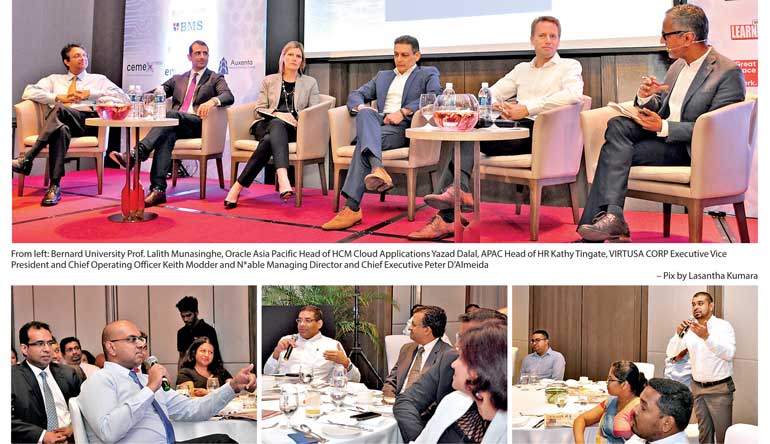Friday Feb 20, 2026
Friday Feb 20, 2026
Wednesday, 21 February 2018 00:00 - - {{hitsCtrl.values.hits}}
 By Shannon Jayawardena
By Shannon Jayawardena
The SLASSCOM People Summit 2018 breakfast forum yesterday highlighted the importance of collaboration and technology in business through a panel discussion.
The panel consisted of N*ableManaging Director and Chief Executive Peter D’Almeida, who served as moderator,Oracle Asia Pacific Head of HCM Cloud Applications Yazad Dalal, VIRTUSA CORP Executive Vice President and Chief Operating Officer Keith Modder, Professor of Economics at Bernard University Lalith Munasinghe, APAC Head of HR Kathy Tingate and Dialog Chief Operating Officer Rainer Deutschmann.
The seventh edition of the forum kicked off with the panel sharing its innovative perceptions and keen advice on talent management under the event’s central theme ‘Transforming the way we think, work and connect’.
Keynote speaker and panellistDalalsaid: “60-70% of the country’s hard costs are likely in people assets. Therefore the way we think about people and treat people, the way we expect them to interact and the way they expect us to interact with them is becoming increasingly important.”
In most cases, people are the primary intellectual property of any business, hence it is very important to listen and learn from one another in order to survive. The extinction of businesses is not a farfetched concept because of the rapid growth of technology.
“Industries are changing at an unprecedented proportion and if we aren’t able to change to keep up and transform then we are going to be at a risk of extinction. However,emerging technologies do create new opportunities so adaptation is key,” said Dalal.
The forum stressed that human participation was very important towards the success of the technology that we consider to be smart, stating that innovation required dreams, failures and successes. Good designs start with the understanding of psychology and technology.
Munasinghe, speaking on the aspect of academia, said: “Many people, when they think of data-driven analytics, think of big data and huge machines, neglecting the storytelling part. Storytelling is simply the theories, models and gut we have of how the world really works.”
The rigorous thought of the academia should be transformed into finding practical solutions for real-life problems. There lies the analytics. Without this storytelling aspect no real in depth value is given to the work. In fact the power of technologies is unlocked through storytelling, he stated.
“It’s now more than ever that we can really partner business to enable the digital transformation. We are starting to think a lot about these future skills, whereas human participation and collaboration are key to core success,”Tingate asserted.
Modder addressed the challenges of the industry by saying: “Competitiveness is important for relevance and if not paid attention to, the workforce of the future is going to be very challenging. Leaders should learn to adapt as innovation happens at the peripheral aspect of the company.”
He stressed the fact that the transformation of the company should change from reactive to proactive as alteration and amendments were essential in order to succeed. Deutschmann, touching upon the value of proper skills management, observed: “Empower people to manage things with the proper skills. Facilitate organisations to be agile. Agility and flexibility are vital towards the triumph of any business.”
Pix by Lasantha Kumara